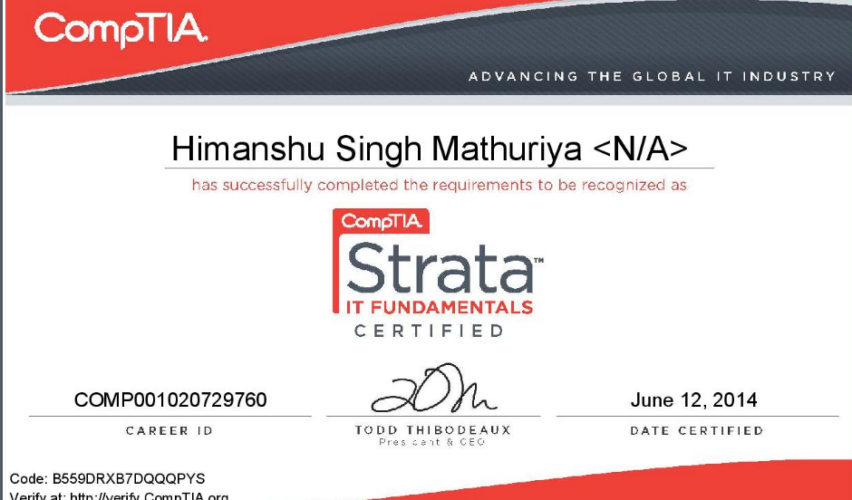Curious about the validity of your hard-earned CompTIA certifications? This guide dives into the world of certification renewal, shedding light on the duration, pathways, and strategies to ensure your expertise remains current. From exploring Continuing Education Units (CEUs) to delving into diverse renewal methods, we uncover the nuances of maintaining your CompTIA certifications.
Stay ahead in the dynamic IT landscape as we unravel the details behind the question: “How long are CompTIA certs good for?”
Do CompTIA Certifications Expire?
Yes, it’s true that CompTIA certifications have an expiration date. These certifications are valid for three years from the exam date.
The good news is that there are several ways to renew a CompTIA certification. To maintain the certification status, you need to earn a certain number of Continuing Education Units (CEUs) within three years after passing the exam.
Each CompTIA certification requires a specific number of CEUs for renewal:
- A+: 20 CEUs;
- Data+: 20 CEUs;
- Network+: 30 CEUs;
- Security+: 50 CEUs;
- Linux+: 50 CEUs;
- Cloud+: 50 CEUs;
- PenTest+: 60 CEUs;
- CySA+: 60 CEUs;
- CASP+: 75 CEUs
Exploring Your Renewal Options: Single Activity or Multiple Activities
When it comes to renewing your certification, you have two primary options: single activity or multiple activities. The main difference between these options is the number of CEUs attributed to your efforts.
Opting for a single activity allows for a swift certification renewal. Conversely, with multiple activities, you need to go through several steps to accumulate the required CEUs.
Let’s delve into these renewal methods and break down the process of updating your CompTIA certifications:
- Single Activity Renewal (Simplified Path): This option stands out for its simplicity, enabling you to renew all certifications in a single day. Here are some strategies approved by CompTIA;
- CompTIA CertMaster CE: This self-paced e-learning program is designed for accelerated renewal of A+, Network+, and Security+ certifications. By paying $129 to $199, you can complete an 8-10-hour qualification course;
- Higher-level CompTIA Certification: Many certification holders prefer elevating their professional standing by attaining a higher-level CompTIA certification. This not only broadens skill sets but also refreshes existing certifications. Ensure that the chosen higher-level certification aligns with your career path;
- Non-CompTIA Industry Certification: Diversify your horizons by obtaining industry certifications from non-CompTIA certification bodies. This approach not only earns you an industry-recognized certificate but also renews your CompTIA certification. However, ensure that CompTIA has approved the specific exam you intend to take;
- Latest CompTIA Exam Version: Opting for the latest CompTIA exam version keeps you abreast of industry developments. Succeeding in this endeavor is relatively easier considering your existing familiarity with the subject matter. Yet, remember that failure results in certification loss.
Clearly, a multitude of single-activity options are available. CompTIA eases decision-making by offering comprehensive comparisons of these alternatives.
Exploring Various Paths for Certification Renewal
CompTIA offers different methods for accumulating CEUs, some of which are even free. It’s worth noting that while CompTIA may not classify another CompTIA exam or certification from an external organization as a sole renewal activity, partial CEU credits may be granted. You need to ascertain whether the certification you choose will be counted for renewal fully or partially.
Additionally, you can accumulate CEUs through:
- Educational Courses and Higher Education: Attending relevant educational courses or obtaining higher education in the IT or cybersecurity field keeps you updated on industry trends and practices while contributing to certification renewal. Accredited educational institutions offering courses and credit units are recognized by CompTIA;
- Active Participation in the IT and Cyber Community: Attending conferences, webinars, seminars, and other events in the IT and cybersecurity domains allows you to interact with peers and stay informed about the latest advancements. To earn CEUs, the event must be pre-approved by CompTIA;
- Sharing Experience through Publications: If you have a knack for writing articles, you can share your knowledge through articles, technical documents, blog posts, or even a book. CompTIA recognizes these materials as effective methods for certification renewal if they adhere to specific rules and are relevant to your existing certifications;
- Demonstrating Practical Work Experience: Your practical work experience in the IT field is a valuable asset for certification renewal. By consistently applying skills and knowledge in your professional work, you earn the right to receive CEUs. It’s crucial to provide CompTIA with appropriate documentation confirming your work experience.
Renewing Expired CompTIA Certifications
To fulfill Continuing Education (CE) program requirements and maintain your certification status, you are provided three years from the certification attainment or renewal completion date:
- Importantly, CompTIA offers a 90-day grace period after the certification expiration. This grace period allows you to settle all CE payment obligations and/or submit CEUs. However, this extension doesn’t grant extra time for continuing education activities;
- Only CEUs obtained within the three-year certification period are considered for renewal. After the 90-day grace period, no additional time is granted, and exceptions are not made.
Obtaining another CompTIA certification or completing CertMaster CE within the grace period will not renew existing certifications.

Conclusions
Navigating the complex landscape of updating CompTIA certifications is a critical task for professionals in the ever-evolving IT and cybersecurity fields. Staying relevant and in demand amid evolving technologies is paramount. This guide sheds light on the path to maintaining hard-earned certifications and showcases various available methods.
Whether you opt for the streamlined approach of renewing certification through a single activity or explore the more diverse paths of accumulating CEUs across multiple avenues, your commitment to continuous learning and growth is commendable. CompTIA’s flexible system takes into account different ways of upskilling, ensuring you possess not only technical skills but also the latest knowledge and cutting-edge experience.
Remember, the renewal process isn’t just about extending certification validity; it’s about continuous education, community involvement, and sharing your expertise. By actively participating in this renewal cycle, you not only enhance your career prospects but also contribute to the vitality and dynamism of the entire IT and cybersecurity ecosystem.
Thus, whether you’re looking to swiftly update CompTIA certifications through a single activity, taking diverse routes, or harnessing the power of education and experience, the path to maintaining CompTIA certifications serves as a testament to your pursuit of professional excellence. As technologies continue their relentless progress, your aspiration to stay at the forefront of knowledge and innovation will undoubtedly remain a cornerstone of your ongoing success.







